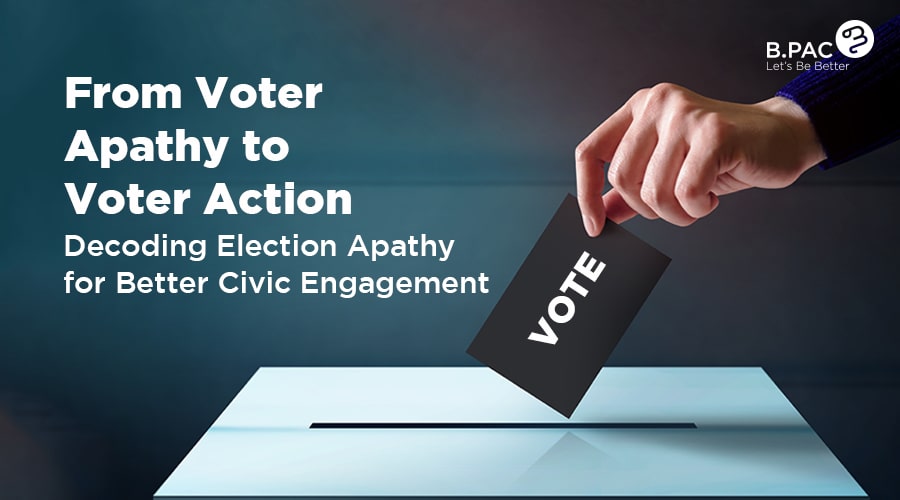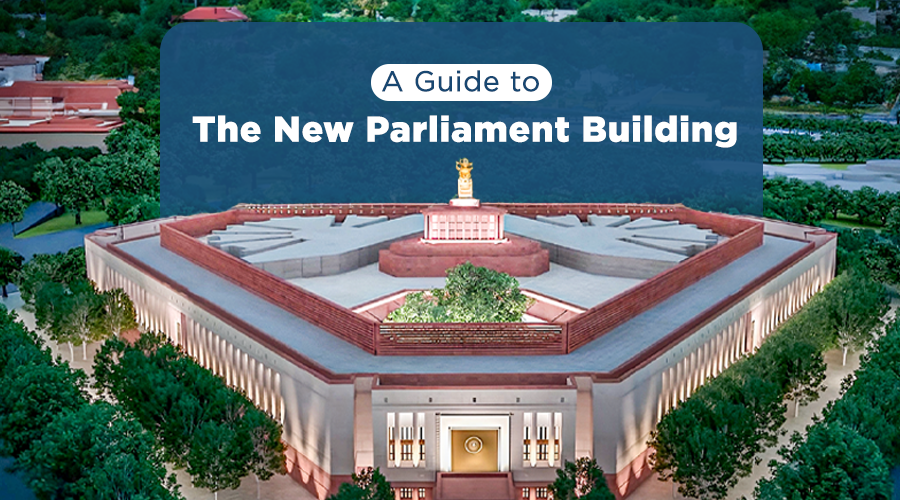“Voter Apathy was and will remain the greatest threat to democracy”
-Hazen Pingree
Election Apathy or Voter Apathy refers to a lack of interest in participating in elections by certain groups of voters, even when elections are a chance for them to have a say in how they should be governed and who should hold political power. It’s a plaguing phenomenon now widely used by the polling panel to refer to the propensity of voters to stay home on election day rather than going to the polls to exercise their Right To Vote.
The lack of interest and disengagement towards the electoral process is becoming an increasingly prevalent issue in numerous countries worldwide. Its roots are varied, ranging from disillusionment with politicians’ sincerity and competence to a sense of powerlessness in the face of seemingly unbreakable political systems. Another reason could be the fact that urban voters do not perceive a relationship between their lives and their ballots. Even if the government changes, they do not notice any major changes in their lives. In this blog, we will delve into the causes of election apathy, its consequences, and potential solutions.
Voter Apathy in Karnataka
In addition to the influence of money, the Election Commission of India has identified voter apathy as another major issue in the Karnataka polls. In previous elections, Bengaluru, the state’s IT hub, consistently had the lowest voter participation. Between 2013 and 2018, Bengaluru saw a decline in the polling percentage across all four voting zones: from 55.04% in the 2013 elections to 51.98% in 2018.
Causes of Voter Apathy
Lack of Interest: One of the primary causes of voter apathy is lack of interest, which is a vexing dilemma that undermines the very foundation of democratic societies. The ennui towards political participation can be attributed to a plethora of factors such as a lack of comprehension or interest in political issues. Voter apathy due to lack of interest is quite common among urban dwellers as they feel the government or political system does not directly impact them.
Disillusionment: Another reason for election apathy is disillusionment with the political system, and distrust in politicians. The loss of faith in the political system and the candidates themselves is quite common among citizens who believe that politicians are not sincere, honest, or competent enough to fulfill their responsibilities. In some instances, they may believe that the electoral process is rigged, leading to disillusionment with politics. This is particularly true in countries where corruption and scandals are prevalent in the political sphere.
Lack of Knowledge: When citizens do not have a firm grasp on the issues and candidates, they may be hesitant to participate in the electoral process, leading to low voter turnout and a diminished democratic mandate. One of the primary causes of voter apathy due to a lack of knowledge is the complexity of political issues. Political discourse is often highly technical and filled with jargon that can be difficult for the average citizen to understand. Another contributing factor is the lack of access to reliable information about political issues and candidates. In some cases, citizens may not have access to quality news sources or may be inundated with misinformation and propaganda.
Sense of Powerlessness: Another reason for election apathy is a sense of powerlessness. People may feel that they have no control over the political process and that their vote will not make a difference. This feeling of disempowerment is especially prominent in young people who are new to the political process or marginalized communities who have historically been excluded from political power.
The Solutions
The consequences of election apathy can be severe. When individuals do not participate in the electoral process, they relinquish their right to have a say in the way their government is run. This can lead to governments that do not represent the interests of their citizens, as the views and opinions of the majority are not reflected in policy decisions. This can result in a vicious cycle where people become even more disillusioned with the political process, leading to even lower voter turnout in subsequent elections.
Furthermore, low voter turnout can significantly impact the legitimacy of the electoral process. If only a small percentage of eligible voters participate, it can be argued that the elected officials do not represent the will of the people. This can lead to protests, social unrest, and even violence, as people become frustrated with the lack of representation in the political process. To address election apathy, there are several potential solutions.
- Election Awareness & Civic Education: One of the most effective ways is to improve political education and civic engagement. This can involve teaching people about the political process, the importance of voting, and the impact that their vote can have on the political system. By doing so, people can feel empowered, giving them a sense of control over the electoral process.
- Improving Transparency: Another solution is to improve the transparency and accountability of the political system. This can involve implementing measures to reduce corruption and improve the integrity of the electoral process. It can also involve ensuring that politicians are held accountable for their actions and that they are responsive to the needs and concerns of their constituents.
- Inspiring & Inclusive Political Campaigns: It is crucial to engage young people and marginalized communities in the political process through several thought provoking election campaigns. This can involve creating opportunities for them to participate in the electoral process, such as through youth councils or other forms of representation. It can also involve ensuring that their voices are heard and that their concerns are taken into account when policy decisions are made via candidate meetups, election panel discussions, etc.
New Initiative by Election Commission of India (ECI)
Apart from the above mentioned contributing factors, there are many voters who face challenges in visiting the polling booth either due to old age or disabilities. To combat this in the upcoming Karnataka Elections 2023, for the first time in India, the ECI has declared the “vote from home” initiative for 5.5 lakh physically challenged people and 12.15 lakh people who are 80 and above throughout the state. In order to monitor the videotaped registration and voting processes, EC representatives will go to the homes of people who choose to vote from home. Secrecy will be ensured when they cast their votes; political groups and candidates will be informed of the home voters. The same should ideally be made available to a wider range of electors. That will inspire more individuals to cast ballots.
To improve voter count, elections are held in the middle of the week to avoid a long weekend, so citizens can be more responsible towards fulfilling their duties.
In conclusion, voter apathy is a complex issue that requires a multifaceted approach to overcome. By promoting transparency and accountability, making it easier for citizens to participate, increasing political education and engagement, and creating a fair and inclusive electoral system, we can encourage more people to engage with the political process and ensure that our democracy remains healthy and vibrant. B.PAC has taken up the cause of combatting election apathy before the upcoming Karnataka assembly election with election awareness campaign- Election Habba. The objective of the campaign is to eliminate voter apathy, inspire and motivate citizens to take an active part in the democratic process by exercising their right to vote. Through the Election Habba, B.PAC hopes to educate voters on the importance of their participation in the election process and empower them with the necessary information to make informed decisions. Visit our website to learn more about Election Habba.





